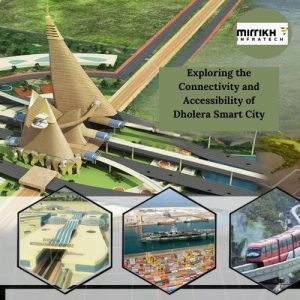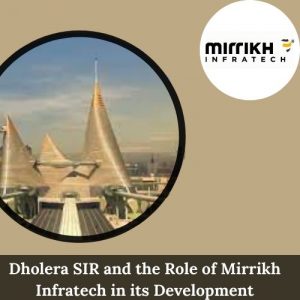As the world grapples with the consequences of climate change and environmental degradation, the need for sustainable urban development has never been more pressing. In this context, Dholera Special Investment Region (SIR), a planned smart city in Gujarat, India, stands out as a beacon of eco-friendly urban planning and transportation. This blog explores the various facets of Dholera’s eco-friendly transportation systems, highlighting how this futuristic city is setting new standards for sustainable living.
The Vision of Dholera SIR
Dholera SIR is envisioned as a smart city that integrates cutting-edge technology with sustainable practices to create a livable, efficient, and eco-friendly urban environment. Spread over 920 square kilometers, Dholera aims to accommodate over two million residents by 2040. The city’s master plan prioritizes sustainability, focusing on green transportation, renewable energy, and smart infrastructure.
Green Transportation Initiatives
Dholera’s commitment to eco-friendly transportation is evident in its comprehensive approach, which includes electric vehicles (EVs), public transportation, cycling, and pedestrian-friendly infrastructure.
Electric Vehicles (EVs)
One of the cornerstones of Dholera‘s green transportation strategy is the widespread adoption of electric vehicles. The city plans to incentivize the use of EVs through subsidies, tax benefits, and the development of an extensive network of charging stations. This initiative aims to reduce the city’s carbon footprint significantly by minimizing reliance on fossil fuels.
Charging Infrastructure: Dholera is investing heavily in charging infrastructure to support the transition to EVs. Charging stations will be strategically located throughout the city, including in residential areas, commercial zones, and public spaces. This ensures that EV owners have easy access to charging facilities, promoting the widespread use of electric vehicles.
Public EV Fleets: In addition to private EVs, Dholera plans to deploy electric buses, taxis, and other public transportation vehicles. This move is designed to provide clean and efficient transportation options for residents and reduce the overall emissions from public transportation.
Public Transportation
Dholera’s public transportation system is designed to be both efficient and eco-friendly. The city plans to integrate various modes of public transport, including buses, trams, and metro systems, to provide seamless connectivity and reduce the dependence on private vehicles.
Bus Rapid Transit (BRT): The Bus Rapid Transit system in Dholera will feature dedicated lanes for buses, ensuring fast and reliable service. The BRT system will be powered by electric and hybrid buses, further reducing emissions and promoting sustainable urban mobility.
Light Rail Transit (LRT): The Light Rail Transit system will serve as a backbone for Dholera’s public transportation network. The LRT will connect key areas of the city, providing residents with a convenient and eco-friendly mode of transport. The system will be designed with energy efficiency in mind, utilizing renewable energy sources wherever possible.
Cycling and Pedestrian Infrastructure
Recognizing the importance of non-motorized transportation, Dholera’s master plan includes extensive provisions for cycling and walking.
Bicycle Lanes: Dedicated bicycle lanes will be constructed throughout the city, encouraging residents to use bicycles for short commutes and recreational purposes. These lanes will be designed with safety and convenience in mind, ensuring a smooth and pleasant cycling experience.
Pedestrian Paths: To promote walking as a viable mode of transportation, Dholera will feature wide, well-maintained pedestrian paths. These paths will be integrated with green spaces and public amenities, making walking not only a practical option but also an enjoyable one.
Integration of Smart Technologies
Dholera’s transportation system will leverage smart technologies to enhance efficiency, safety, and sustainability.
Intelligent Transportation Systems (ITS)
Intelligent Transportation Systems (ITS) will play a crucial role in managing traffic flow, reducing congestion, and improving road safety. ITS will include:
Traffic Management Systems: Advanced traffic management systems will monitor and control traffic in real time, optimizing signal timings and reducing bottlenecks. This will lead to smoother traffic flow and lower emissions from idling vehicles.
Smart Parking Solutions: Smart parking solutions will help drivers find available parking spots quickly, reducing the time spent searching for parking and decreasing emissions. These systems will use sensors and mobile apps to provide real-time information on parking availability.
Renewable Energy Integration
Dholera’s transportation infrastructure will be powered by renewable energy sources, such as solar and wind power. This integration will help the city achieve its goal of becoming carbon-neutral.
Solar-Powered EV Charging Stations: Many of the EV charging stations in Dholera will be powered by solar panels, ensuring that the electricity used for charging vehicles comes from clean, renewable sources.
Renewable Energy for Public Transport: The city’s public transportation systems will also be powered by renewable energy. Solar panels and wind turbines will be installed at bus depots and LRT stations, providing a sustainable energy source for these facilities.
Policy and Regulatory Support
The success of Dholera’s eco-friendly transportation initiatives will depend on strong policy and regulatory support from the government.
Incentives for Green Transportation
The government will offer various incentives to encourage the adoption of green transportation. These may include:
Subsidies and Tax Benefits: Financial incentives for purchasing EVs and using public transportation will make these options more attractive to residents.
Regulations for Emission Standards: Strict emission standards for vehicles will be enforced, promoting the use of cleaner and more efficient transportation options.
Public Awareness Campaigns
Public awareness campaigns will be conducted to educate residents about the benefits of eco-friendly transportation. These campaigns will highlight the environmental, economic, and health advantages of using EVs, public transport, and non-motorized transportation.
Economic and Social Benefits
Dholera’s eco-friendly transportation system is expected to bring numerous economic and social benefits to the city and its residents.
Job Creation
The development and maintenance of green transportation infrastructure will create numerous job opportunities in various sectors, including construction, manufacturing, and technology.
Health Benefits
Reduced air pollution and increased physical activity from cycling and walking will lead to improved public health. Residents will enjoy cleaner air, lower rates of respiratory diseases, and a higher quality of life.
Economic Growth
Efficient and sustainable transportation will attract businesses and investors to Dholera, driving economic growth and development. The city’s green credentials will make it an attractive destination for companies looking to establish themselves in an environmentally friendly environment.
Challenges and Solutions
While Dholera’s eco-friendly transportation initiatives are promising, they are not without challenges. Some of the key challenges and potential solutions include:
High Initial Costs
The initial costs of developing green transportation infrastructure can be high. To address this, the government can explore public-private partnerships (PPPs) and seek international funding and grants for sustainable development projects.
Technological Adoption
Ensuring the widespread adoption of smart technologies and EVs can be challenging. The government can provide training and support to residents and businesses to facilitate the transition to new technologies.
Public Participation
Achieving public buy-in for eco-friendly transportation initiatives is crucial. Engaging with the community through consultations, workshops, and participatory planning processes can help build support for these initiatives.
Conclusion
Dholera SIR is poised to become a model for sustainable urban development, with its comprehensive and forward-thinking approach to eco-friendly transportation. By prioritizing electric vehicles, public transportation, cycling, and pedestrian infrastructure, Dholera is setting new standards for green urban mobility. The integration of smart technologies and renewable energy further enhances the city’s sustainability credentials.
As Dholera continues to develop, it will serve as an inspiration for other cities around the world, demonstrating that sustainable urban transportation is not only achievable but also essential for a greener and more livable future. Through strong policy support, community engagement, and a commitment to innovation, Dholera is paving the way for a new era of eco-friendly urban living.




